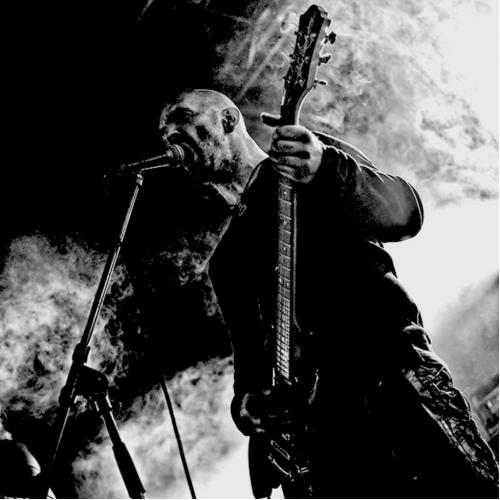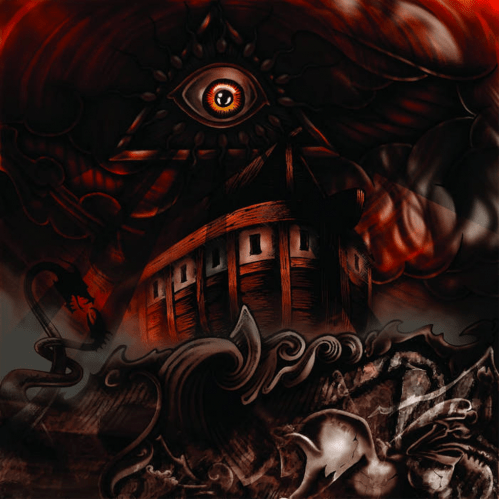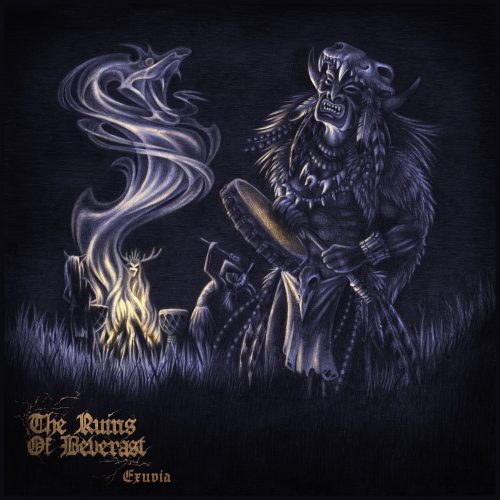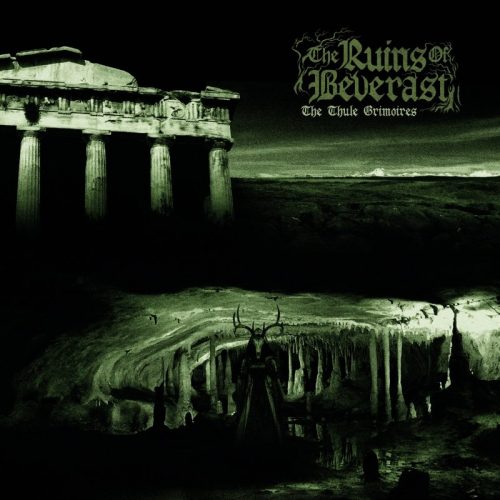
(The scheduled release by Ván Records of a new album by The Ruins of Beverast inspired our contributor Nathan Ferreira to prepare the following extensive retrospective on the band’s catalogue, as well as thoughts about the new album and its place within the ever-changing evolution of the band’s music.)
The Thule Grimoires is the latest work in a sprawling back catalogue that encompasses an incredible variety of unique textures which consistently go beyond what one expects out of a band in the atmospheric black/doom metal pantheon. Alexander von Meilenwald’s attention to detail in every facet of his music (composition, aesthetics, musicianship, lyrical themes, you name it) has long been the envy of one-man black metal bands everywhere. Everything about The Ruins of Beverast is cloaked in a sense of artistry and greater meaning that has grown and evolved throughout the band’s career.
Because of this, and because of the ridiculous amount of layers and themes in The Thule Grimoires, I felt it desirable to reflect on von Meilenwald’s back catalogue to give more context to what makes this band and this album so special.
Along the way, I’ve also included some streams for listening, as well as links to older interviews for anyone looking for a more detailed background on the origins behind this wonderful project; the man behind the music certainly has an erudite and articulate character, which only really comes out when he speaks and writes. Hopefully this write-up can succeed in doing a modicum of justice to such an astonishing career.
NAGELFAR
Beginning with a slight detour, we must first acknowledge von Meilenwald’s initial contributions to German black metal that put him on the map. Nagelfar are criminally overlooked (having a Swedish Naglfar probably doesn’t help), with three solid albums that are maybe just a tad late to be considered part of the second wave. Nonetheless, they have some incredibly evocative moments. Virus West is probably my personal favorite as it’s the most developed and aggressive, but the more melodic and traditional Hünengrab im Herbst, posted above, is the earliest showcase of the first piece in the puzzle of The Ruins of Beverast – the drumming.
With their efficient aggression and careful cymbal work to create atmosphere, the drums are a huge factor in the strength behind Hünengrab’s effect, and the composition and structure of the drumwork are factors that von Meilenwald would carry into his later output. Even just knowing that drums, not guitars, are von Meilenwald’s primary instrument helps to understand his solo project in a different light, and suddenly it makes more sense why he’s able to hold your attention for long stretches of time with a more minimalist approach. His militant seriousness and stark, surprisingly emotional blasting helped to elevate Nagelfar, and that’s arguably the standout element of the band.
UNLOCK THE SHRINE // RAIN UPON THE IMPURE
Digging through older interviews, it seems von Meilenwald himself considers these two albums to be very different; the former being a more spontaneous outburst of ideas that he had in the wake of Nagelfar’s demise, and the latter being a more intentional, “cinematic” interpretation of The Ruins of Beverast, closer to the sounds von Meilenwald envisions in his head.
That being said, the thinner production quality and adherence to conventional black metal styles that pop up on both albums (holdovers from the early days, perhaps), in addition to the evolution in sound that happened later on, makes me consider the first two albums the band’s “early era”. The experimentation isn’t quite as constant and radical, and there’s fewer of the unique characteristics that make The Ruins of Beverast such a treat… but this is still one of my favorite periods upon further re-listening.
Unlock the Shrine showcases all the capabilities this band has in the riff department, with simple melodies that paradoxically bring forth grandeur and depth. It’s more black-metal focused, but it’s hard to say that any other black metal coming out in 2003 sounded similar, and it still shows hints of the more sophisticated structures and layers that would emerge later to a greater degree. Rain Upon The Impure is much more expansive, still within the same vein but with more of a focus on the harrowing ambience and the fusing of unique, doom-laden textures into an eerie tremolo background.
I find the embryonic nature of Unlock the Shrine to be more consumable in bite-sized packages, whereas Rain Upon the Impure demands to be listened to in full, as demanding as that is with the amount of ground it covers and the 78-minute runtime. Nonetheless, putting this on for 10 minutes in the background to get the idea just won’t suffice; you need to experience the highs and lows. I would recommend the debut album as a more casual entry point into this band, whereas the sophomore might take a few more spins before it fully reveals its magic, so you should only dive into it if you’ve got the time and the patience to really let it sit with you and seep its way into your brain.

INTERVIEWS (2005 – 2007)
http://www.old.mirgilus.com/interviews/ruins.html
https://www.metalcrypt.com/pages/interviews.php?intid=195
FOULEST SEMEN OF A SHELTERED ELITE // BLOOD VAULTS
This next duo of albums is where The Ruins of Beverast expanded upon and fully established their sound, and also gained much more widespread momentum and recognition. The artwork and aesthetic are much more elaborate and colorful; the clean vocals and haunting overtones are more thoroughly fused into the guitar work; but the most notable difference is the added funeral doom tendencies – particularly on Blood Vaults, which almost entirely foregoes the black metal riffs to focus on a more expansive interpretation of the groundwork laid by bands like Skepticism and Thergothon. Foulest Semen of a Sheltered Elite has a few sections of hale, blistering tremolo and a thinner production, but still mainly plays with the same sort of unique transcendent seriousness that defines this project.

“I ceremonially predicted your distress
I raised this stone as a ghastly memorial
It has not been visited by the sun
Not been carved with an iron knife
Let no man lay it bare
While the waning moon wanders
Let not misled men remove it”
–Taken from “I Raised This Stone as a Ghastly Memorial”
The lyrics cannot go without discussion in a Ruins of Beverast retrospective because they’re the starting point for everything, fully written before a note of the song they will describe ever sees the light of day. Clearly informed by von Meilenwald’s education in literature and history, they possess a cryptic feel that is detailed enough to create imagery but vague enough that they leave some things open to interpretation. Coupled with a powerful, versatile roar that adds a demanding, archaic presence, the words behind the music have a power that is untouchable in the realm of one-man bands. Perhaps there’s something in the fact that von Meilenwald prefers to record vocals while intoxicated.
Both of these releases have fleshed out the conceptual aspect, perhaps symbolic of the band’s expansion and added depth to their sound as a whole. Blood Vaults, being a concept album, was composed lyrically in full before any of the songs were written at all, a unique feature of that album among the rest of The Ruins of Beverast’s discography.
This tends to be the most revered section of this band’s back catalogue, and with good reason: It’s got all the elements that make them great in one form or another, and again they have defied the conventions of atmospheric black and doom metal in a different way than they did in their early era. It’s hard to rank where it stands for me because Blood Vaults is my personal favourite Ruins of Beverast album, where Foulest Semen… is my least favourite. Not to say it isn’t worth hearing, far from it. If anything, it may be the ideal gateway album into this band, because it’s got a bit of everything as the transition between eras, but the scratchier sound coupled with a looser, experimental approach that was still playing with where funeral doom might really fit in, makes it the album I return to the least.
Blood Vaults still gives me chills years later the same way it did when I first heard it. It’s the most complete album front to back, with a narrower range of motion that the rest of The Ruins of Beverast’s discography, which does nothing to restrict the sense of scope, but rather underscores the massive production quality and masterfully layered compositions, making the album hit that much harder. It may be the simplest piece they’ve ever done, but it hits the hardest too. It’s the funeral doom record I always wanted to hear.
INTERVIEW (2013):
https://www.invisibleoranges.com/32024

EXUVIA
Alexander von Meilenwald is never one to rest. Not after he reinvented black metal twice, not after almost two decades of making solo music, not even after finding the hidden space between black and doom metal with a seemingly endless well of ideas to offer. He could have just released Blood Vaults part 2 and I would have been more than satisfied, but instead dropped Exuvia, which takes everything that The Ruins of Beverast are and twists it all together in a tribal soup with some kind of psychoactive, quasi-spiritual properties to it.
This is the first album to use a professional studio, as well as the first release after the band re-tooled into a live unit, and it is the most evident in the extra ambience and vocal chanting that appear as recurring themes throughout multiple songs. Time has bred the ability to weave all the disparate sonic elements into a coherent fabric, and as a result, Exuvia is overwhelming, fascinating, and intriguing all at once, always adding a new layer or another twist just when you think a song can’t get any more tripped-out. Outside of the underground metal sphere, this seems to be one of the band’s more popular albums, which caught the attention of listeners who might not normally be into this type of music, a testament to its timelessness and genre-transcending nature.
The sudden detour into shamanic ritualism isn’t radical enough to the point where this feels like a different band, but combine that with the added touch of professionalism and studio post-production and it becomes very difficult to consider this a part of the same “era” as the two albums that came before it. On previous albums, there were different elements drawing you in – on the early work it was for the incredible riffs and bleak, psychosis-ridden atmosphere; in their mid-period the draw was in the elegant presentation and execution on top of the masterful fusion of different styles; and with Exuvia, the draw is in its uniqueness and density. That’s the real beauty of every new Ruins of Beverast album – you know it’s going to be good, but you’re never sure what is going to make it so good.

THE THULE GRIMOIRES
With all the sudden mutations that Alexander von Meilenwald has enforced upon his project throughout the years, I had no idea what I was going to expect from this. Would The Ruins of Beverast return to their black metal roots? Would they continue to journey further down their tribal, psychedelic rabbit hole? Would they release a crushing, despondent doom album, or maybe something that was more rooted in ambient textures as opposed to heavy metal?
To all of the above, the answer is yes.

Lining the opening of the album and the frequent surges in energy, the straightforward and effective tremolo melodies never completely shed the connection to von Meilenwald’s days in Nagelfar. The symphonics have a sheen to them that is reminiscent of the ’80s pop and synthwave that von Meilenwald would have grown up with, the back half of “Anchoress in Furs” and the track that follows it being absolutely drenched in it, among numerous other moments where its minimal presence completely dominates your attention.
Like every other Ruins of Beverast album before it, the composition and musicianship make it obvious it’s the product of the same mind, but every album presents those base-building blocks in a way that is unique not only for the project itself, but for the genre of black metal as a whole. Simply put, there isn’t anyone else who can write songs like this guy.
Keeping to his M.O. of always reinventing himself, the idiosyncratic spice in The Thule Grimoires is the quasi-gothic vibe that gives a somber, depressing catchiness to the music, like World Coming Down-era Type O Negative stretched and distorted by an unsettling acid experience. There are more frequent uses of low baritones that do their best Peter Steele impression, and the harsh vocals have a choppiness and speed in their delivery during the more aggressive sections that seems to be a new element von Meilenwald is experimenting with.
Where Exuvia was dense, all-encompassing, and overflowing with different layers, The Thule Grimoires is warmer, emptier, and plays with the space in the songs more, despite this feeling like a shorter album. It’s not – it’s still over an hour long – but something about the way this is written makes it feel more concise. Two decades of songwriting experience means von Meilenwald knows when to pick up the pace, and when to slow things down once the intensity of the more aggressive moments begins to fade. In addition, normally I’d be scoffing at a band that suddenly tried to include a more gothic element to their music, but this album shows he got it perfect on the first try, seamlessly weaving in a strange influence where most others would fall short. With a more matured production quality, this may be the band’s most accessible album yet without sacrificing any of the uniquely eerie qualities that older fans will look for.
The Thule Grimoires will be released on January 30th (digital) and February 5th (physical) through the band’s long-time partner Ván Records. If this retrospective enticed you to go through The Ruins of Beverast’s past albums, you can find a lot of them (and pre-order the new album) on the label’s website.
PRE-ORDER:
https://van-records.com/
https://theruinsofbeverast.bandcamp.com/album/the-thule-grimoires
FACEBOOK:
https://www.facebook.com/The-Ruins-Of-Beverast-116265971848680
